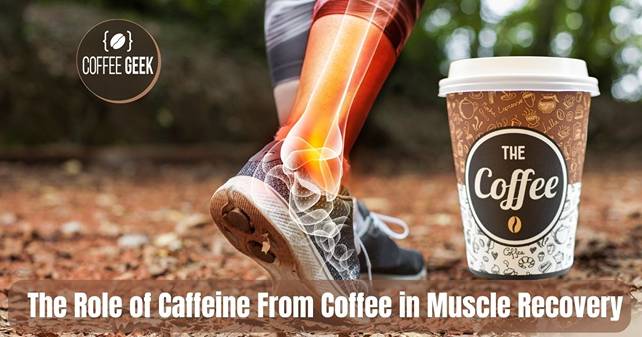Unlock the secret to making your workouts more effective. This article explores the surprising advantages you can gain from having a cup of coffee after workout.
We provide insights into various studies conducted on caffeine consumption and it’s a correlation to enhanced performance, faster recovery time, and overall health benefits.
- Why Should You Consider Drinking Coffee After Workout?
- How Much Coffee Should You Drink After Exercising?
- What Are The Primary Benefits When Drinking Coffee After a Workout?
- What's The Right Time to Drink Coffee After a Workout?
- How Could Drinking Coffee Extend to Long-term Health Benefits?
- Conclusion
- Questions And Answers
Why Should You Consider Drinking Coffee After Workout?

Drinking coffee post-workout can provide benefits beyond just perking you up.
It aids in muscle recovery, enhances glycogen synthesis, and offers a healthier alternative to energy drinks. Let’s delve into this a little deeper.
The Role of Caffeine From Coffee in Muscle Recovery
Studies have shown that caffeine from coffee can aid muscle recovery. After a strenuous workout, muscles can feel sore and may take time to recover.
By integrating coffee into your workout regimen, it could speed up this process, aiding in faster muscle repair and growth.

The Effect of Coffee on Glycogen Synthesis
Glycogen is an essential energy store that your muscles need for effective workouts.
Drinking coffee after a workout can enhance glycogen synthesis, leading to improved energy levels for your next exercise session.
This extra boost can make all the difference in your performance.

Drinking Coffee as an Energy Drink Alternative After Working Out
Swapping your post-workout drink for a cup of black coffee could be more beneficial than you think.
Black coffee is a natural, calorie-free source of caffeine that provides similar energy-boosting effects, minus the sugars and other additives commonly found in energy drinks.
How Much Coffee Should You Drink After Exercising?
The optimal caffeine dose, and intake for athletic performance varies by individual, but guidelines usually suggest limiting your daily caffeine intake to about 400 milligrams or less.
Understanding the Suggested Caffeine Intake for Athletic Performance
400 milligrams of caffeine, equivalent to around four cups of coffee, is often suggested as the maximum daily caffeine consumption.
Exceeding this could lead to counterproductive effects such as restlessness, sleep disturbances, and an irregular heartbeat.

Measuring the Appropriate Amount of Caffeine in Your Cup of Coffee
The amount of caffeine in a cup of coffee varies greatly depending on the type of coffee and the brewing method.
On average, an 8-ounce cup of coffee usually contains about 95 milligrams of caffeine. Knowing the caffeine content of your coffee can help you regulate your daily intake.
Finding the Balance – The Difference Between Three Cups and Four Cups of Coffee
While a fourth cup of coffee might seem tempting, consider the potential effects on your sleep and overall stress levels.
Sticking with three cups a day instead allows you to enjoy the benefits of coffee without overstimulating your body.
What Are The Primary Benefits When Drinking Coffee After a Workout?
With science backing the habit of sipping coffee post-exercise, let’s dive into some specifics of how it can impact your health and fitness journey.
Enhancing Fat Loss with Post-Workout Coffee Consumption

Drinking coffee after a workout can activate fat cells, making them easier to burn during your daily activities. This could boost your fat loss, helping you reach your fitness goals faster.
How Drinking Coffee Could Help You Recover Faster
Thanks to its caffeine content, coffee may reduce exercise-induced muscle pain, allowing you to recover faster and train more frequently.
Studies Indicating the Role of Coffee in Boosting Muscle Glycogen Levels
Research has shown that glycogen, the body’s energy reserve, replenishes faster when athletes consume coffee after exercise, providing them with more energy for their next workout.
What’s The Right Time to Drink Coffee After a Workout?
The timing of your post-workout coffee matters, as it plays a role in maximizing the drink’s benefits. Here’s what you should know:
Timing Your Coffee Intake to Achieve Athletic Improved Performance
Sipping coffee halfway through your cooldown or within 30 minutes of completing your workout can enhance recovery and increase muscle glycogen stores for the next workout.

Understanding the Effect of Caffeine Intake on Muscle Recovery Time
Drinking coffee immediately after your workout could improve muscle recovery time by reducing inflammation and pain associated with intense exercises.
Strategically Integrate Coffee Into Your Workout Schedule to Maximize Benefits
Planning your coffee intake around your workout schedule can help you capitalize on its performance-enhancing and recovery benefits. Whether you decide on coffee before or after exercise, understanding the right timing is crucial.
How Could Drinking Coffee Extend to Long-term Health Benefits?
Aside from improving workouts, drinking coffee could also bring long-term health benefits, contributing to your overall wellness by acting as a powerful antioxidant, helping manage type 2 diabetes, and even potentially increasing your lifespan.
Consider Coffee as a Source of Antioxidants in Your Daily Diet
Coffee is rich in antioxidants which can protect against oxidative stress and inflammation, contributing to better health and fighting against diseases.
Understanding the Correlation Between Coffee Drinking and Reduced Risk of Type 2 Diabetes
Several studies have shown a link between the regular consumption of coffee and a reduced risk of developing type two diabetes, thereby adding another reason to maintain your coffee-drinking habit.
Studies Show Caffeine Can Increase Your Lifespan – Finding Moderation
Recent research points towards an association between moderate coffee consumption and longer lifespan, although more concrete evidence is still being sought.
As you revel in the benefits of taking coffee post-workout, remember to enjoy it in moderation to have a healthier life.
| Aspect | Information ☕💪 |
|---|---|
| Introduction | Consuming coffee after a workout has gained popularity for its potential benefits. |
| Caffeine Content | Coffee contains caffeine, a natural stimulant that can enhance alertness and energy levels. |
| Performance Boost | Caffeine may improve physical performance by increasing adrenaline levels. |
| Muscle Recovery | Some studies suggest that caffeine can help reduce muscle soreness post-exercise. |
| Metabolism Impact | Caffeine can temporarily boost metabolism, potentially aiding in fat burning. |
| Hydration Consideration | Coffee is a diuretic, so it’s important to balance it with water intake for proper hydration. |
| Timing Matters | Consuming coffee about 30-60 minutes before a workout may optimize its effects. |
| Protein and Coffee | Combining coffee with protein post-workout may support muscle recovery and synthesis. |
| Individual Variability | The response to coffee varies among individuals, and moderation is key. |
| Potential Drawbacks | Excessive caffeine intake can lead to jitteriness, insomnia, or digestive issues. |
| Conclusion | While coffee can be a part of a post-workout routine, individual preferences and tolerance should be considered. |
Conclusion
The topic of having coffee after a workout is one that garners interest, especially among fitness enthusiasts and regular coffee drinkers.
Understanding how coffee interacts with your body post-exercise can help you make informed decisions about including it in your fitness regimen.
Many experts suggest waiting until after your workout to have coffee, as it can provide a boost to your recovery process.
Drinking coffee after a workout may help refuel muscles and recover quickly from rigorous exercising.
This is because caffeine stimulates the body in various ways, including increasing your metabolic rate, which in turn aids in fat loss by increasing the rate at which you burn calories.
Research also indicates that caffeine is most beneficial when consumed at a rate of about six milligrams per kilogram of body weight.
However, it’s essential to pay attention to possible downsides.
Consuming too many cups of coffee along with other caffeine sources like supplements can lead to an excessive intake of caffeine, which might not always be beneficial.
For instance, too much caffeine rapidly increases blood levels of the hormone adrenaline, which travels through your blood to the fat tissues, telling them to release fats into your blood.
This can be beneficial for fat loss but may not be suitable for everyone.
The response to caffeine can vary from person to person, so it comes down to personal preference and body response, much like picking your go-to workout or mix.
A regular coffee drinker may have a different tolerance and response to caffeine than someone who rarely consumes it.
The benefits of coffee, such as its ability to suppress any post-workout fatigue and boost your RMR (Resting Metabolic Rate), have provided significant performance gains for many athletes.
In conclusion, whether you opt for black coffee or another form of caffeine after finishing your workout, it’s important to consider how it fits into your overall dietary and fitness goals.
Coffee after a workout is a fit for many, offering benefits like increased metabolic rate and helping to refuel muscles.
However, it’s also crucial to be aware of how much and when you consume it, with research suggesting that the optimal time might be about 60 minutes before your workout for maximum benefits.
As with any dietary choice, moderation is key, and being aware of your body’s response to caffeine will help you decide whether having one to two cups of coffee after your workout is right for you.
Questions And Answers
What are the benefits of drinking coffee after a workout?
Drinking coffee after a workout can help in muscle recovery. It also provides an energy boost, enhancing your mood, which allows you to enjoy the rest of the day.
Moreover, it offers a lovely incentive to complete the workout to enjoy that cup of coffee afterwards.
How many milligrams per cup of coffee should I drink post workout?
The ideal amount varies per individual. However, typically around 100-200 milligrams per cup is fine.
Always consider how your body reacts to caffeine.
Is there any difference between having coffee before and after working out?
Yes. Having coffee before a workout can give you the energy boost to perform better.
However, having black coffee after your workout can support in muscle recovery and provide a feeling of relaxation.
What do people usually say about timing your coffee and workout?
Most fitness enthusiasts recommend timing your coffee also with workouts well.
Some prefer having a cup an hour before hitting the gym, while others opt for black coffee right after wrapping up their workouts.
How can I incorporate coffee into your workout mix?
You may start by playing around with sipping coffee before or after a workout.
Always consider how your body reacts as everyone’s metabolism and stimulation to caffeine are different.
I heard about people sipping coffee before a run. Is this advisable?
Yes, sipping coffee before a run or any other workout can boost your stamina and enhance performance.
However, be sure not to overdo it as excess caffeine can cause jitteriness.
Can I consume other caffeine products along with coffee?
Yes, you can, but remember – moderation is key. Getting too much coffee caffeine along with other caffeine products can cause side effects like insomnia and nervousness.
Should I opt for black coffee or can it be with cream and sugar?
It depends on your workout goals. If you target to lose weight, opt for black coffee as it’s calorie-free.
However, if you just intend a delightful experience post-workout then a cup with cream and sugar would be a joy.
I love coffee. Is it recommended to have two cups of coffee: one before and after workout?
If you rely on coffee to fuel your workout and then another one after your workout for relaxation, it’s fine.
However, you must consider how your body reacts to caffeine. It’s always best to keep your overall daily caffeine intake in check.
Is there any study to determine whether drinking coffee around a workout is beneficial?
Yes, several studies have been conducted to see if coffee around a workout is beneficial.
Most have shown positive results, stating that it can improve workout performance and speed up recovery, provided it’s consumed in a proper manner.

